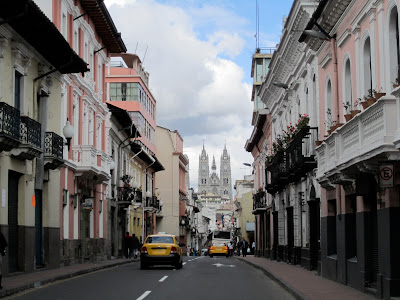From the mid 1500s until 1822, Quito was a major center of Spain's colonial empire in the Americas, part of the Viceroyalty of Peru. From Quito, Spain administered its religious, political and economic policies for the region. In El Centro Histórico, one can see the vestiges of this empire. According to UNESCO, Quito has the largest, best-preserved, and least-altered historic center in Latin America, despite several earthquakes. In fact, it was the first city to be inscribed onto the UNESCO World Heritage List. After lunch last weekend, I had the opportunity to stroll around the old city with Katia and her son Miguel. Here's some photo evidence.
The day-to-day musings of yours truly as I roam this great big ball o' rock...hot diggity BLOG!
Sunday, January 16, 2011
El Centro Histórico de Quito
First, a quick geography lesson: Quito is a very long, narrow city, built in a valley between mountains. North to South, the city is divided into three distinct districts. The northern part is modern and wealthy, home to the financial district, hotels, restaurants, shopping centers, and middle/upper class housing. The southern part is industrial and residential, with many working class neighborhoods and some of the poorest neighborhoods. Most of the abuelitos live in Southern Quito. Central Quito is comprised of the colonial old city, El Centro Histórico de Quito.
From the mid 1500s until 1822, Quito was a major center of Spain's colonial empire in the Americas, part of the Viceroyalty of Peru. From Quito, Spain administered its religious, political and economic policies for the region. In El Centro Histórico, one can see the vestiges of this empire. According to UNESCO, Quito has the largest, best-preserved, and least-altered historic center in Latin America, despite several earthquakes. In fact, it was the first city to be inscribed onto the UNESCO World Heritage List. After lunch last weekend, I had the opportunity to stroll around the old city with Katia and her son Miguel. Here's some photo evidence.
From the mid 1500s until 1822, Quito was a major center of Spain's colonial empire in the Americas, part of the Viceroyalty of Peru. From Quito, Spain administered its religious, political and economic policies for the region. In El Centro Histórico, one can see the vestiges of this empire. According to UNESCO, Quito has the largest, best-preserved, and least-altered historic center in Latin America, despite several earthquakes. In fact, it was the first city to be inscribed onto the UNESCO World Heritage List. After lunch last weekend, I had the opportunity to stroll around the old city with Katia and her son Miguel. Here's some photo evidence.
Subscribe to:
Post Comments (Atom)






Quito looks gorgeous! You should post some pictures of other parts of the city as well, like the neighborhood you're living in. Nice picture of you and the kid.
ReplyDeleteI was going to complain about how I couldn't tell what was going on in this post because there weren't any words, but then I realized I had just scrolled past the words really fast to get to the pictures. Still haven't read the words.
ReplyDeletethis is christine. i don't know why my name is all numbers and letters and hyphens now
ReplyDelete